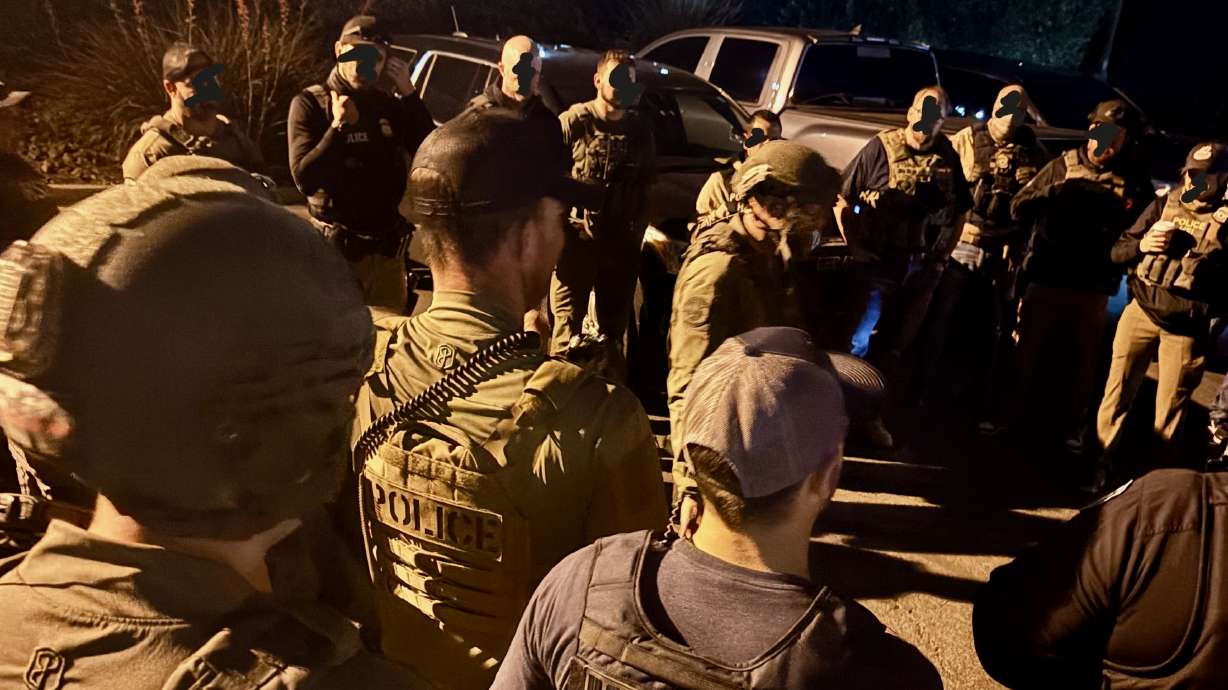SALT LAKE CITY — As another Utah law enforcement agency teams up with federal immigration officials to fight illegal immigration, the American Civil Liberties Union of Utah is raising its voice against such cooperation.
Riverton leaders announced Friday that the Riverton Police Department had entered into a formal accord with Immigration and Customs Enforcement to jointly pursue immigrants in the country illegally. The department joins several other sheriff’s offices across Utah and the Utah Department of Corrections in entering into what federal authorities refer to as 287(g) agreements.
Like representatives from other agencies entering into 287(g) accords, Riverton authorities touted the agreement as a way to assure public safety and better fight crime.
“It allows federal immigration authorities and our local law enforcement team to work side-by-side to locate and remove criminal offenders who threaten public safety. By putting federal resources to work here in Riverton, we can better protect our residents, uphold the rule of law and keep our neighborhoods safe from criminal activity,” reads a joint statement issued Friday by Mayor Trent Staggs and Police Chief Shane Taylor.
No one from Riverton was available on Tuesday to respond to follow-up questions from KSL.com regarding the arrangement.
An ACLU of Utah rep, however, said Tuesday that the rising number of such accords is worrisome to the organization, in part because they could deter some people, particularly immigrants, from seeking help from law enforcement authorities. The link between local law enforcement and immigration officials could spur worries among some immigrants that interacting with police officers or sheriff’s deputies could put them on the radar screen of federal immigration agents.
The ACLU of Utah is voicing concern with increasing cooperation between local law enforcement and federal immigration officials. The photo comes from a May 14, 2025, operation involving police in Washington in southern Utah and Immigration and Customs Enforcement agents. (Photo: Salt Lake City field office, U.S. Immigration and Customs Enforcement)
“The 287(g) agreements let the federal government turn local law enforcement into immigration agents, leading to potential discrimination and civil rights violations,” said Aaron Welcher, spokesman for the Utah civil rights organization. “This isn’t public safety. It makes people afraid to call for help, report crimes or cooperate with law enforcement.”
The growing number of local law enforcement agencies entering into formal agreements with immigration officials has been a point of increasing concern for Utah ACLU officials. Late last month, the organization launched a petition drive to drum up opposition to them. “These agreements turn local officers into Immigration and Customs Enforcement agents, fueling deportations, racial profiling and fear in immigrant communities,” reads the petition.
Welcher said he’s heard particular concern from immigrant advocacy groups in Utah about the impact of the increased cooperation on those experiencing domestic violence. Some facing domestic abuse, he said, “are afraid to call for help because it could lead to them being detained or deported.”
Utah County leaders’ decision last July to formalize a 287(g) agreement between the Utah County Sheriff’s Office and ICE sparked intense backlash from some. However, with fighting immigration a priority of the administration of President Donald Trump, other accords involving the sheriff’s offices in Cache, Washington and Weber counties, among others, have sparked little to no public clamoring.
As described by proponents, 287(g) agreements facilitate communication with immigration authorities, enabling local law enforcement to determine whether suspects they are dealing with are in the country illegally or face deportation. Local law enforcement officials receive training in accessing federal immigration records and working with federal authorities, aiding with efforts at jails and in the field to identify immigrants in the country illegally.
According to the U.S. Census Bureau’s five-year American Community Survey estimates for 2023, 2,314 of Riverton’s 44,944 residents were foreign-born. Of those 2,314, 1,049 were naturalized citizens and 1,265 were of some other unspecified migratory status. The 1,265 — 2.8% of Riverton’s population — can include immigrants in the country illegally, legal permanent residents, people here on student visas, asylum-seekers and others.
The Salt Lake field office of ICE said the 287(g) agreement with the Weber County Sheriff’s Office led to the detention last month of four suspects who were on federal immigration officials’ radar screen.
The Key Takeaways for this article were generated with the assistance of large language models and reviewed by our editorial team. The article, itself, is solely human-written.
